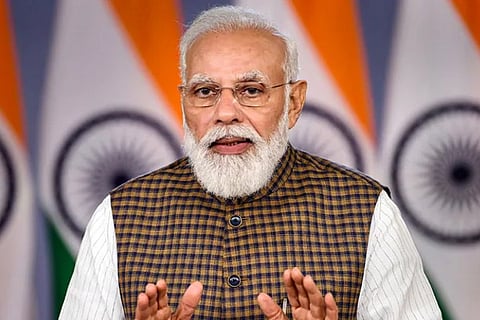

New Delhi
The Farmer’s Produce Trade and Commerce Act (which allows sale outside APMCs), the Farmer’s Empowerment and Protection Agreement (that permits marketing of produce freely), and the Essential Commodities Amendment Act (freeing food grains, pulses, and edible oils for trade) are the laws that will be repealed.
Modi couched an apology to millions of farmers, regretting he could not translate his vision of the reformatory laws to the community.
While the announcement was met with jubilation on the Singhu, Tikri, and Ghazipur borders, where thousands of farmers have been camping for over a year, parties in the Opposition made it clear the decision had little to do with the welfare of farmers, and more to do with the upcoming elections in strategically crucial States such as Uttar Pradesh and Punjab.
Talks of a potential seat-sharing arrangement between Punjab’s former chief minister Amarinder Singh and the BJP government have also been doing rounds. Ironically, the farmer unions had met with the Agriculture Minister on as many as 11 occasions but the rendezvous ended in an impasse.
The repeal could be seen as a victory for the people and India’s democratic values. But one must also consider the sacrifice made over 15 months for these laws to be taken back, laws that farmers believed served vested corporate interests and proponents of privatization more than the farmers.
Over 700 farmers had lost their lives in the run-up to this historic announcement. Loss of life aside, there was a loss of face, and that of identity suffered by millions of farmers, who were accused of being Andolan-Jeevis (those who thrive on protests) and anti-nationals, manipulated by non-State actors like supporters of the pro-Khalistani movement in Canada.
Those who toiled to put food on our tables were branded Public Enemy No 1, and concrete barriers were erected in border towns to prevent them from entering Delhi.
The farm laws had drawn the attention of the global community too. Swedish environmental activist Greta Thunberg was caught in the crosshairs as the Delhi Police had filed an FIR against her for tweeting a toolkit instigating farmers to continue their protests, a move that would be of little consequence to Thunberg.
Instead, her counterpart in India, Disha Ravi, another climate activist spent three days in jail on charges of conspiracy and sedition. The social media blitzkrieg that followed saw the likes of Hollywood star Susan Sarandon and pop icon Rihanna coming forth to voice their support for farmers’ rights in India.
Things had come to a head-on India’s Republic Day celebrations when a group of protesters from the farming community branched off from peaceful agitation and decided to storm the Red Fort, dislodge the tricolor from the ramparts, and place a religious flag atop it. Many months later, in an act of cold-blooded murder, a convoy of SUVs trailing a minister’s kin mowed down eight individuals, who included farmers in Lakhimpur Kheri, further cementing the value of a farmer’s life in India.
On Friday, Rakesh Tikait, the spokesperson of Bharatiya Kisan Union echoed the sentiments of many farmers when he said they were not going to wind up the protests and vacate the borders anytime soon as there is a sense of distrust in the actions of the Centre.
Many stakeholders conveyed that the speed at which the farm laws were implemented should not be the speed at which they are repealed. This time around, there’s a need to go back to the drawing board and do the right thing, especially in areas such as MSP and power tariffs. For ordinary Indians, it might offer a glimmer of hope that democracy, no matter how battered, might not be dead after all.
Visit news.dtnext.in to explore our interactive epaper!
Download the DT Next app for more exciting features!
Click here for iOS
Click here for Android